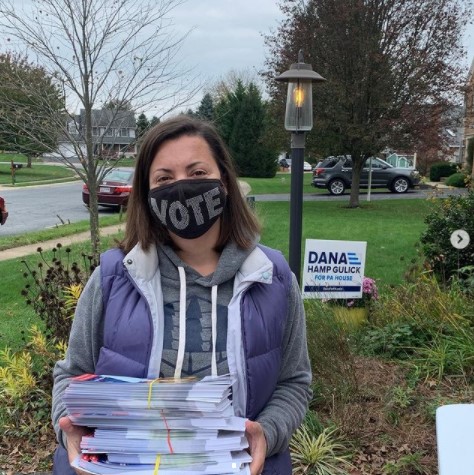
International election expert Christina Hartman held an inspiring motivational meeting with candidates who ran for office but were not elected. The main topic is how to make sure that losing the election does not stop you.
Hartman was a candidate for the United States Congress in Pennsylvania’s 16th district in 2016 and 2018, and in 2019-2020 she ran for the office of Pennsylvania Auditor General.
She shared her experience of participating in election campaigns, talked about unfortunate defeats and the difficult path of finding motivation to move forward in her political career and public life.
The event was organized by the National Democratic Institute (NDI).
50% collected for you by the advice of Christina Hartman.
I lost

I am twice a loser. Believe me, it took me a long time to accept defeat, to go in front of a group of strangers and call myself a loser with a smile. After all, losing an election is very demotivating. And it’s even harder to talk about defeat out loud.
In 2016, I ran for Congress from Pennsylvania and, like most Democratic candidates, I lost. After losing in 2016, I ran for Congress again, but somewhere in the middle of the race, the district boundaries changed and it became obvious that the Democrats were not going to win there, so I just had to stop running. I did my best to win and although the situation was out of my control, I had a great sense of loss. In 2020, I ran for the post of general financial auditor. And she lost again.
Losing an election is disappointing and annoying. But the biggest problem is that we often focus on other people’s perception of our defeat. It seems to us that after such a public loss, we will only be remembered for the fact that we lost. We’re sure everyone will say, “They lost because they were terrible candidates.”
In fact, this is not the case. Most people have no idea what you are going through.
How to survive an election loss and move on

It took me a long time to get over the loss
It is necessary to treat defeat as an important experience. Of course, it is difficult, but we must see new opportunities in defeat.
It took me a long time to get over the loss. But if I hadn’t given myself enough time to accept defeat, I would never have been able to run again.
You will definitely have to go through several stages. First, there will be a stage of admitting defeat, and then you should allow yourself to grieve.
It is also necessary to allocate time for self-care. It can be meetings with friends, with other candidates, sports, marathon viewing of TV series, meditation, etc. Each of us has our own effective methods of recovery.
You must find time for yourself. It is necessary to survive this loss and let go of anger. It is actually very difficult. The feeling of anger may return.
Then you have to recover, restore your boundaries and protect yourself. If you don’t, you won’t be able to motivate yourself to do any new activity. Especially if you want to run again.
Even after defeat, remember that you are amazing, you are brave and strong. In fact, voters are grateful to you for being ready to enter politics. If politics were easy, everyone would do it.
What did I do right? What did I do wrong?

After you have fully recovered, start evaluating your election campaign. This will help you not only understand what you did right and what could have been done better, but also help you accept losing the election and make a decision about whether you want to run again in the future.
To analyze your election campaign, you will have to find answers to the following questions:
- What did you do right (and would you do again next time)?
For example, you successfully conducted live broadcasts on social networks, worked with voters in chats. So I learned to present the party program professionally and so succinctly that ordinary citizens can understand it.
- What could you do better or differently?
For example, after analyzing the election campaign, you can understand that it was necessary to appear before the voters more often, to attend public events. Perhaps it was worth working more actively with social networks, attracting more volunteers, starting to prepare for the campaign earlier, etc.
- What was out of your control?
Never listen if they tell you: “You shouldn’t have run for office.” Don’t focus on what’s out of your control (like party politics or legislative changes), focus on what you’re doing right and can do better. As candidates, we should be as focused as possible on ourselves. Because you can only control yourself.
- What are your achievements?
Accomplishments are something that can be counted, measured, even added to your resume. For example, I managed to attract 20 volunteers who had never worked on an election campaign before. Also an achievement is the creation of headquarters from scratch, coverage of 10,000 voters, etc.
It’s out of my control
There are many factors beyond your control: voter stereotypes, limited funding, your competitors who used illegal methods (bribery, rigging at polling stations), pressure from competitors and sexism, lack of sufficient information about elections and candidates on election day, the epidemiological situation, custom ratings, administrative resource and media resource of the current government, disinformation campaign in social networks.
I would advise you to put this information in a separate box and put it aside. Forget about her. Just don’t focus on things you can’t control.
You are in the future

People are very grateful when they are listened to
After evaluating your election campaign, you should create a step-by-step plan for improvement.
Don’t stop and keep connecting with people, even your rivals, attend events, keep listening to the needs of the people in your community.
When I talk to people, I say my favorite phrase ” tell me more “. People are very grateful when they are listened to. Write on social networks about issues that concern you, draw attention to important issues. Tell about the mistakes of those who were elected, talk about your proposals to emphasize your difference. Stay in the political game.
It is important not to lose the skills you have acquired during the election race. For example, if I learned how to speak well in front of an audience, I would look for a job where this skill is important. You can consider volunteering.
You can also start your own business or consider working in public organizations, local government bodies, or start sharing your own experience.
The most important advice I heard from the manager of my election campaign. He told me after the defeat that I should act like a leader and a winner, because I really am. You have to act like you won.
Where to find inspiration
As one of the most famous athletes of the 20th century, the Canadian hockey player of Ukrainian origin, Wayne Gretzky, said, you miss 100% of the shots you didn’t make. “You miss 100% of the shots you don’t take.” That’s why you have to try, you have to try to score a goal.
I will share with you a list of what helped me recover and find inspiration to move on:

- Watch the series ” Losers ” on Netflix about athletes who experience defeat. After losing the election in 2018, I watched this series and it helped me a lot.
- Read ” Ode to a Fearless Woman ” by the poet Nikita Gill.
- Prepare and write down your immediate plans, a kind of “to-do list”.
- Write a letter to your future self.
- Read the book Lead from the outside by Georgia gubernatorial candidate Stacey Abrams, there are 3 useful exercises you can do in your free time: 1) strength mapping ( you identify your strengths, your goals and the people who can help you achieve them goals), 2) prioritization and 3) a new attempt (thinking about mistakes, analyzing what you know and what you don’t know). The words of Stacey Abrams are very inspiring to me: “I have faced the worst defeat I could ever imagine, and because of that I know that I will lose again and again. But I will never stop trying again.”
Are voters really insincere?

It is very important that people like you so that you can build a trusting relationship with voters
Finally, I would like to note that our victory depends on the voters. But even after losing, I would not accuse the voters of insincerity.
They vote for what they really want. But every voter wants something different. I know you’re focused on your platform during the election race, and that’s really important. But it is also very important that people like you so that you can build trusting relationships with voters.
They are more likely to vote for someone they like and trust, even if they don’t agree 100% with that person’s platform. So they might like your program, but then they’ll come to the polling station, say, “My neighbor is on the list, he’s cool,” and vote for him.
What is the most difficult thing during election campaigns?

Conducting election campaigns is the best job of my life
The most difficult thing is, of course, losing. There are also many extremely unpleasant situations, especially women suffer from this. For example, in 2016, the Republican Party released a video that Hillary Clinton and I created ISIS. This is an absurd video. We don’t know Hillary well enough to create terrorist organizations in a dark room. But this video was shared, and it was difficult to accept this negativity. It especially upset my mother.
But despite everything, I can say that conducting election campaigns is the best job of my life.
Originally Posted on 50vidsotkiv.org

